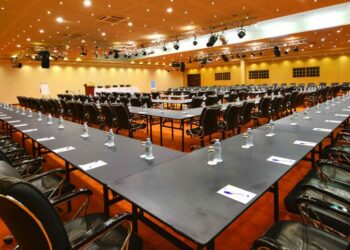By Norbert Mao
The last week saw Ugandans receiving two major constitutional addresses – the State of the Nation Address and the Budget Speech. Everyone who cares is now familiar with the text. But the subtext or context is what should concern Ugandans most. After all in terms of content there was no ground shaking policy pronouncement. It was leftovers warmed in the microwave oven of State House and served as fresh to a weary populace.
Once again, the epidemic of our Low Expectations Syndrome was in full play. Not much was expected, not much was delivered. Live and let live. No wonder the mood of the president and subsequently the Finance Minister was bereft of the expected sense of occasion. Even the Speaker’s occasional appeal for order and decorum fell on deaf ears. It was as if an unprepared teacher was speaking to an unruly class.
The president’s self congratulatory mood reminded me of Chinua Achebe’s folktale about a lizard that fell off a tall Iroko tree and, surprised that it did not die, looked around for applause. Seeing none, it proceeded to nod enthusiastically in self praise. The story goes on to say that from that moment the lizard’s conceit knew no boundaries. Convinced that it is a heavy weight, the lizard, before climbing up any tree grips the tree trunk and does a form of press up to determine whether the tree is sturdy enough to carry its full weight.
Given the stark evidence of the widening gap between the haves and have nots the issues keeping Ugandans awake are economic in nature. Museveni’s optimism, real or feigned, is thus misplaced and came as a shock to the majority of Ugandans wallowing in poverty. But the economic issues are a result of leadership failure – call it politics. Things don’t just happen. They are made to happen either for better or for worse by individuals and groups trusted with the mandate to run public affairs.
Dealing with inequality is the defining issue of Uganda’s economy today. It is this inequality which is the greatest insecurity we face. 31 years down the road Museveni should accept that Ugandans are not contented with physical security. They need economic and political security.
As expected the address skirted around the issue of governance without acknowledging the political logjam we have in Uganda today with an illegitimate government in place led by a person whose victory will continue to be questioned for ages. With characteristic arrogance Mr. Museveni declared, “my long stay in power is actually good for Uganda”
The heart of the matter was the economy. Museveni has vowed that by 2020, Uganda will be a middle income country. This may be an impressive jargon but let’s unpack it. That term is based on the so called Atlas Method that the World Bank uses to rank the economy of countries. Low Income countries where Uganda falls have a Gross National Income per capita of US$1,045 or less. Middle income countries have a Gross National Income (GNI) per capita of between US$1,045 and US$12,736. (of course middle income countries are further subdivided into lower middle income and upper middle income countries. Lower middle income countries have a GNI per capita of between US$1,046 – US$4,125. Upper middle income countries have a GNI per capita of US$4,126 – 12,735). High income countries have a Gross National Income per capita above US$12,735.
From looking at the state of our economy, the absurd proclamation that Uganda will be a middle income country by 2020 is a political hoax smacking of deception and gimmickry. With a balance of trade of minus US$164.6 million, global business confidence of only 54 percent, military expenditure of US$340 million, inflation of over 6 percent and growth at only less than 4 percent, Uganda’s ambition of attaining middle income status under the current NRM economic framework is a pathetic pipe dream that no one can take seriously. This is coupled with an unsustainably high external debt which costs Uganda a lot of money to service. Then there is the lack of fiscal discipline, unattractive wages that fuel brain drain, high unemployment of over 60 percent and run away corruption. This is what constitutes the hemorrhage that Museveni dwelt on during his dull and unimaginative address to a demoralized nation. It is this hemorrhage that is responsible for the heavy tax burden under which Ugandans agonize.
Do you have a story in your community or an opinion to share with us: Email us at editorial@watchdoguganda.com









